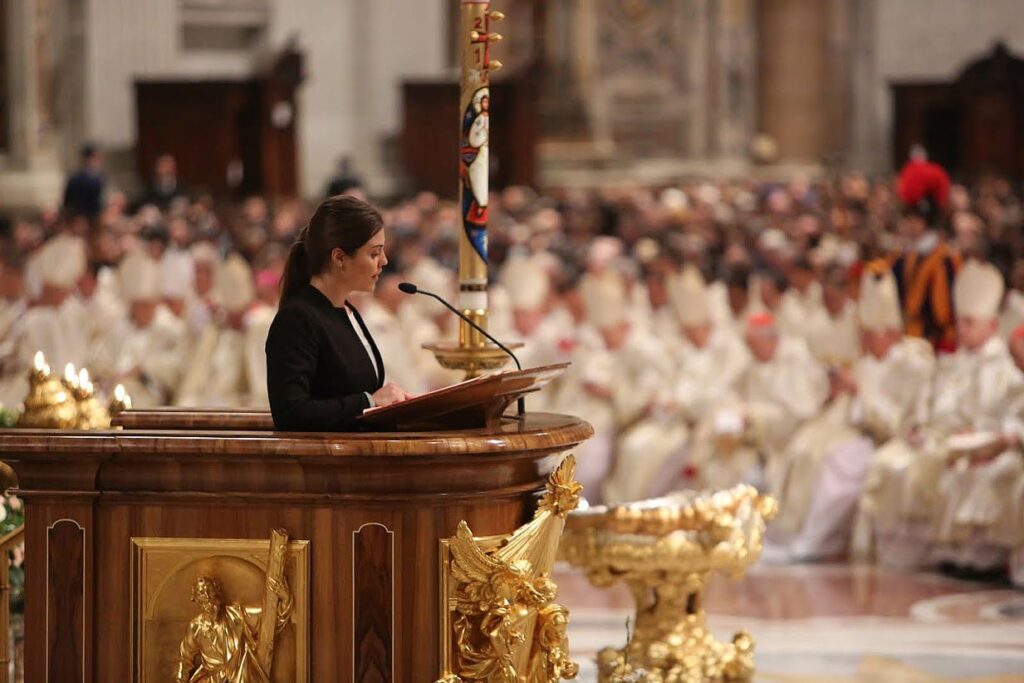Lectors Ministry
Lectors PrayerA lector must have the qualifications listed below and have a desire to minister in this capacity at the Eucharistic liturgy.
- This ministry in the Church requires a person who is of excellent character and serious about the practice of their faith.
- The lector must believe that Sacred Scripture is the Word of God and have deep respect for God’s presence in that Word.
“God is speaking, but for too many churches he is not being heard. Where the proclamation of the Word is perfunctory, flat and uninvolving, the congregation takes refuge in missals, and follows the text there. Most of those who act as readers seem unaware that God communicates through them during the liturgy of the Word. Or if they are aware , they do not act as if they believe it. So the assembly does not believe it either. Nobody believes it. The Word falls on stony ground. Readers would understand that God speaks through them; That God actually uses the reader’s voice to communicate with his gathered people.”

Tips/Guidelines for Reading Scripture in Public Worship
‘Speak up for God’s sake’ —- Marian Tolley (TABLET, 2003 June)
- Come to the sacristy at least 10 minutes before Mass. Check the ‘ordo’ for the right reading. Prepare the reading and pray the prayer displayed in the sacristy. If you doubt a word or pronunciation, ask the priest.
- If for some unforeseen reason, you cannot come when you are appointed, please request another Lector to replace you on that day or/and inform the person incharge for that mass of your unavailability/replacement.
- Acknowledge that public Scripture reading is an important ministry. If you are asked to do so, say no if you don’t have the gift or have no time to get ready. If you accept, be sure to prepare. The Church needs people who are comfortable speaking through a mike, have an emotional range in their own personality, and are confident in front of a group.
- See for yourself how interpretation makes a difference. Consider the words “Her name was Elizabeth.” Say it aloud four times, each time emphasizes a different word. How does your emphasis change the meaning of that simple sentence?
- Make sure you understand the meaning of the passage you will read during public proclamation.
- Get comfortable with expressing an emotional range. Read the same sentence in different ways to suggest different emotions. Deep, sing-song, staccato, chanted, fake foreign accent, disgusted, whiny, ultra smooth, monotone, and other voices.
- Use pauses effectively. Note the difference in these readings of Luke 2:16:
- They went with haste and found Mary and Joseph and the child lying in a manger.
- They went with haste (pause) and found Mary and Joseph and the child lying in a manger.
- They went with haste (pause) and found Mary and Joseph (pause) and the child lying in a manger.
- Look up from your reading only to reinforce the message. “Avoid the bobbing head effect.”
- Read; don’t act. “People understand you are reading, so don’t think you have to move your body or gesture a lot.” Simply stand tall so your voice projects, use the mike, and read the text. However, do try to read so that your facial gestures are evident, even if you have to hold the Bible above the lectern.
- Prepare ahead of time by reading aloud. Simply reading silently to yourself will not help you identify potential problems of pronunciation, pauses, and pacing.
Spiritual Director: Fr Gavin D’Souza
Co-ordinator: Smita Anthony